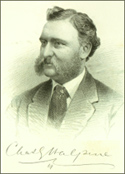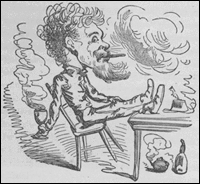
Charles Graham Halpine
|
Halpine was born in County Meath, Ireland, the son of a Church of Ireland clergyman whose first love was the written word. The elder Halpine served as editor of the Dublin Evening Mail for many years, so it was only natural that his son should follow in his footsteps when he enrolled at Trinity College. Although he studied medicine and later law, young Halpine's spare time was spent writing for the newspapers. He eventually left Trinity and sought permanent employment as a journalist, first in Dublin and then in London. When his father died in impoverished circumstances, Halpine determined to try his luck in America and emigrated in 1851.
When Halpine first came to this country, he wrote advertising copy in verse and later worked as a private secretary for P.T. Barnum. After leaving the circus impresario's employ, he moved back into journalism, becoming the co-editor of The Carpet-Bagger, a weekly humour publication. From there he moved to The New York Herald as its French translator and then to The New York Times as the correspondent assigned to cover William Walker's Nicaraguan expedition. He served briefly as the Times' Washington correspondent and then became an associate editor. In 1857 he became the principal editor of The Leader after acquiring a financial interest in the publication. His interest in the political scene, which had begun in Dublin, was rekindled, and he eventually left the newspaper to act as private secretary to politician Stephen A. Douglas. He became a member of the general committee of Tammany Hall and began a gradual drift into New York City politics, to which he would return as a reformer after his military career had ended.
On April 20, 1861, shortly after the Confederates fired on Fort Sumter, Halpine became the lieutenant of Company D of the 69th New York State Militia, which would later become the 69th New York Volunteer Infantry and gain reknown as part of the famous Irish Brigade. After serving only a few months, Halpine mustered out but enlisted again on September 5 in the General Volunteers. He eventually rose to a staff position with General David Hunter in South Carolina, where he drafted for Hunter's signature orders authorizing the raising of the Army's first black regiment.

Miles O'Reilly
|
Halpine returned to New York City and assumed the editorship of The Citizen, a reform newspaper, and built up the Democratic Union, a fierce opponent of political corruption. Despite his involvement in local politics, he still found time to write, publishing Miles O'Reilly His Book (1864) and Baked Meats of the Funeral (1866), a collection of war tales and various essays. He died in 1868, the victim of an accidental overdose of chloroform intended to cure a severe headache.
The Dictionary of American Biographies adds that Halpine suffered from a nervous stutter and characterizes him as "versatile, impetuous, and of a tremendous and restless energy."